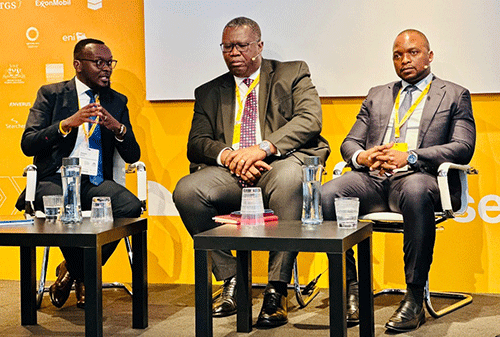Moses Magadza
LILONGWE – The just ended 51st Plenary Assembly Session of the SADC Parliamentary Forum, held in Lilongwe, Malawi, was held under the theme ‘Towards Energy efficiency, sustainability and self-sufficiency in the SADC region’.
Leaders of delegations from SADC member countries shared experiences on energy security during a symposium organised at the start of the plenary.
The minister of energy for Malawi, Ibrahim Matola, moderated the symposium, calling for regional integration of the energy sector.
He said Malawi was hit by cyclone Nana on 24 and 25 January this year, and lost 130 megawatts.
“I urge the parliamentarians to remove all the obstacles to achieving access to energy. Malawi and Tanzania are jointly developing the Songwe River Basin project, which will produce almost 190 megawatts,” he said.
Matola said Malawi had hydro power plants on one river, which was not good for energy security because should a cyclone hit the first plant and then the second and the third, then Malawi would be plunged into darkness.
He called for countries to have mini grids on small rivers and parliaments to pass laws that all government institutions, such as hospitals, prisons and schools, should invest in solar energy and stop using wood fuel.
Zimbabwean lawmaker Anele Ndebele made remarks on behalf of the Zimbabwean delegation. He said Zimbabwe is mainly dependent on coal, petroleum, hydroelectric power and biomass for its energy needs.
The country had come up with a raft of legislation to spur growth in the sector and was also looking at exploiting oil and gas deposits. He noted that in 2018, an Australian company Invictus Energy limited confirmed a potential 215 million barrels of oil deposits in Muzarabani, Mashonaland Central.
“These deposits show that if adequate investment is made, the country has potential for energy self-sufficiency in the long run,” said Ndebele.
He said Zimbabwe was implementing a US$1.5 billion Hwange Thermal Power Station expansion project in Matabeleland North province, which was set to impact positively on the economy.
Zimbabwe had established a Rural Electrification Fund, whose objectives are to facilitate rapid and equitable electrification of the rural areas of Zimbabwe.
He said the role of parliament is to promulgate laws that promote energy production.
“In that respect, our parliaments need to ratify and domesticate the SADC protocols on energy as well as continental and international energy protocols,” he added.
The leader of the Namibian delegation, Agnes Kafula, said Namibia’s main energy sources are petroleum, hydropower, imported electricity and imported coal.
She said the country generates about a third of its energy needs.
“Although Namibia has made progress in electricity provision, the country still faces many challenges, including that just 50% of citizens have access to power,” she said, adding that many people use renewable energy to supplement the national grid energy supply.
She noted Namibia recently introduced a US$12 billion hydrogen project to transform the country into a major renewable energy player by producing 300 000 metric tonnes of green hydrogen a year.
Although the world is moving away from non-renewable energy sources, such as oil, Kafula said Namibia believes in mixed energy – taking advantage of both sources for the benefit of all Namibians.
Seiso Joel Mohai (member of parliament), who led the South African delegation, said a national development plan had identified the need to invest in energy infrastructure to meet industrial and household energy needs.
He said coal would continue to play an important role in electricity generation in South Africa, as the country has an abundance of the resource.
“New investment will be directed towards more efficient coal technologies – of high efficiency, low emissions, underground coal precipitation and carbon capture and storage – to enable us to continue using our coal resource in a responsible way,” Mohai said.
He said the government accepts that nuclear energy can contribute to a significant reduction of emissions, as there is a global move towards developing small reactors.
He revealed that in addition to wind and solar power, South Africa has reserves of high grade vanadium, platinum, palladium, nickel, manganese, rare earth, copper and cobalt that are vital for the energy sector.
From Zambia, Jeff Murebwa (MP) said demand for energy in Zambia had been increasing because of the country’s economic growth.
He explained that to have consistent and affordable energy for the country and beyond, the Zambian government had embarked on a vigorous programme to harness renewable energy.
“Solar generation sites were identified, and solar mini grids were set up to provide electricity to the rural communities. Despite the enormous potential in the sector, the biggest challenge is the lack of investment, resulting in the country facing in medium- to long-term debt,” Murebwa said.
Phandu Tombola Chaha Skelemani, Speaker of the Parliament of Botswana, said his parliament recently passed a national energy policy because Botswana relies on South Africa, Mozambique, Namibia and Zambia.
“The problem is that we rely on coal to generate power, but we have not developed the technology to cure the coal to reduce the gases emitted.
“We, however, have lots of sunshine for solar power, and we have identified three sites where we can set up solar energy plants,” Skelemani said.
As we move on to establish a SADC parliament, we should also plan at that level so that those who are able to produce efficiently can share with others,” the Speaker of Botswana suggested.
Minister Matola concurred: “We need to add more power and focus on the regional integration, and there is an opportunity of power trading within the region,” he said.
Maria Marta Marteus Zalimba, MP from Mozambique, said Mozambicans were fortunate because much of the country’s population had access to electricity, while the government planned building another dam to supply electricity.
She said it was ironic that some countries had water but did not have the means to convert that water into energy, while other countries had the technology but lacked access to water.
She recommended that SADC works as one to ensure energy efficiency and security.



